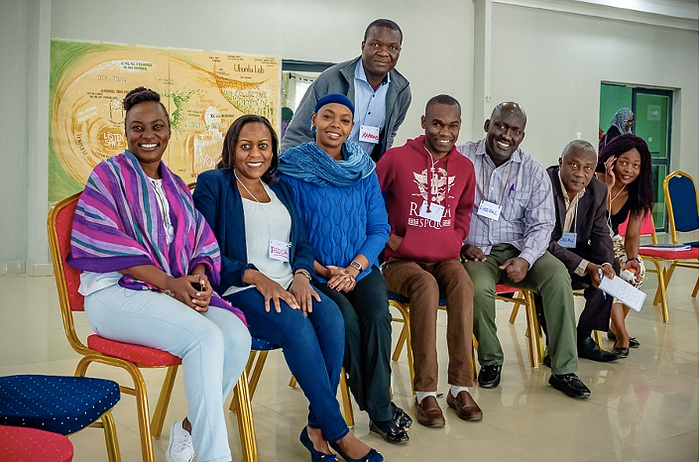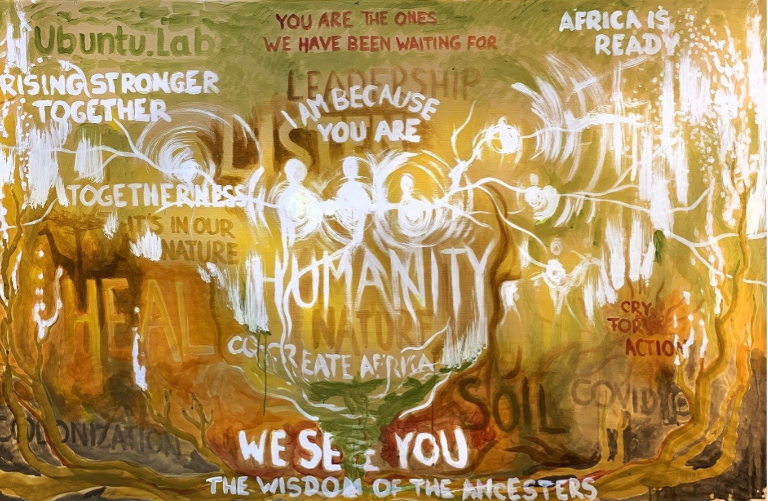On the power of collective intention and action on the continent of Africa
A Simple Question
It was a simple question, but the answer Martin received completely changed the trajectory of his life. Martin Kalungu-Banda is a Presencing Institute (PI) core team member, he has his roots in Zambia, and he is passionate about transformation in business, governance, and leadership. Martin asked the question during the first round of u.lab, a program held by the Presencing Institute to bring together global changemakers. In the eyes of his colleagues, the program had been a huge success. It brought together over 15,000 changemakers from all over the world. Or so they thought. For the question which Martin asked was:
How many of these 15,000 changemakers are calling in from the continent of Africa? The answer was shocking. It was three. Only three people, of the 15,000, were calling in from the continent of Africa.
Hearing this made his heart sink.
“This is how my continent, Africa, gets left behind,” Martin felt.
While many of his colleagues were celebrating the achievement of getting 15,000 people to connect, made visible through a digital map that lit up the geographical areas from which people were calling in from, Martin’s heart sank when he saw that the continent of Africa was literally left in the dark.
Yet, at the same time, he felt something else. And this ‘something else’ was the intention to create a similar program called u-school Africa. However, as many of us know, an intention does not automatically lead to action. For two years or so, Martin continued to repeat and repeat this intention, in meetings and in conversation, and was met with an enthusiastic and supportive response. But, beyond the uttering of these words, not much actually happened. “For two years, I sounded like a broken record,” Martin recalls.
Then, something changed. And it had nothing to do with u-school Africa. In fact, it was a completely different line of work. Martin and two colleagues from the Presencing Institute had been asked to host a program around new ways of consulting. At the last minute, they were asked to hold it online. This was a time where hosting an event online was still very unusual. Martin and his colleagues felt like this switch from in person to online indicated a lack of interest from the participants. Despite this frustration, they ran the program online and, to their surprise, it was a huge success. If people show up to an online meeting, and the program resonates even over the digital interface, then the u-school Africa dream might be possible. The vision for u-school Africa (now known as Ubuntu Lab) depends on the online component as a key aspect of its project. Thanks to the positive online experience from this event, the intention of u-school Africa was then revived.

Scribing by Olaf Baldini
The Birth of Ubuntu
Without any outside funds, but with a strong desire for this intention to turn into action, Aggie Kalungu-Banda, who is also originally from Zambia with a background in developmental studies, and who is married to Martin, decided to travel to several African countries. Scraping together what she could, she traveled on her own costs to meet with people who might be able to help actualize the dream of u-school Africa. She traveled to Kenya, Tanzania, Rwanda, South Africa, and Zambia to meet with possible national coordinators whose job it would be to recruit facilitators whom they could then train.
One of the biggest challenges facing u-school Africa is the cost of data for participants to connect online with the program facilitators. Since the program is both online and offline, Aggie and Martin realized that they needed to find a way to spend more time in-person than online. For this, well-trained facilitators had to be on the ground to host and hold the in-person aspects of the hybrid model.
With momentum, the project carried forwards. After Aggie had met with and identified the very first four national coordinators (from Tanzania, Zambia, Kenya, and Rwanda), the national coordinators and the initial faculty (Martin Kalungu-Banda, Aggie Kalungu-Banda, Julie Arts, and Olaf Baldini) began to meet on a weekly basis.
Conquering the Odds
It took about six months to train the first cohort of facilitators. This training took place online, with the intent to end with an in-person weekend. After months of meeting online, the participants were eager to meet in person as the final moment of the training. The excitement was palpable, but when the news came that the donor who had been financing the program pulled out at the last minute, everyone’s hearts sank. Due to a misunderstanding, it now looked like there would not be the funds to allow for the in-person meeting to take place. After such a successful start to the dream, and after months of training and of looking forward to meeting in person as the first cohort, the disappointment was palpable.
But sometimes all it takes is one dissenting voice to change the direction of things. When the faculty announced that the event was canceled, one of the facilitators responded by saying: why should we just give up? Let’s do it on our own. Let’s show that Africa is ready to do the work.
And so, on their own costs, over 50 participants traveled to Zambia from all over the continent. Through one of his contacts, Martin found a venue in Zambia which they could rent at a discounted price. Everyone who was able to come, came. And, with their partners at PI, WWF and YMCA chipping in, this in-person meeting became a reality.

Social Theatre during facilitators training
As people came from all over the continent, they filmed themselves as they got on the plane or the car to travel to Zambia. The energy of the day was one of celebration. The connections that were made during these few days have lasted until today. Just recently, Martin recalls, one of the trained facilitators from the weekend went to Uganda for the first time in her life to attend a conference. And she was welcomed by people whom she had never met, but who had heard that she was there through connections made via Ubuntu.Lab, and who then went and met up with her.

Facilitators training Lusaka 2018
Sharon, who participated in this first cohort and has now gone on to become the executive director of Ubuntu.Lab, remembers coming into this room in Zambia, with the chairs set up in a circle and many round tables, and a schedule that lasted from a 7am meditation to 9pm interviews with special guests, and how people came from all parts of the continent, from all walks of life and in their own, unique way. “That we could be together in this way,” Sharon recalls, “was a celebration of just being in this space and being human.”
Looking back, Martin describes the facilitators training, which took place against all odds, as “the birthplace of the dream.”
The Ubuntu philosophy is: I am because you are. We have already been seeing the importance of the quality of relations threading itself through the story of Ubuntu.Lab from day one. The story of Ubuntu.Lab is one of the coming together of community, of uniting across colonial borders and of discovering the potential that lies within a collective intention and will. If we think back to that map, where the vast continent of Africa only had three little lights…we might now imagine all the spots that would light up now and think: this is what happens when a community comes together, no matter what challenges they may face…a living example of the ubuntu philosophy.
Now, five years after Martin asked that question, Ubuntu.Lab has trained over two hundred facilitators from all over the African continent. It is now a recognized legal entity, with a faculty of fourteen people representing six countries, and with twenty-seven national coordinators representing seventeen African countries. In Part Two of this series, we will take a closer look at impact of Ubuntu.Lab by looking at some stories and prototypes that are emerging all over the continent of Africa.
Scribing by Olaf Baldini during Cohort 5
Teaser photo credit: Scribing by Olaf Baldini during Cohort 4 — “Rising Stronger Together” programme — 2021





